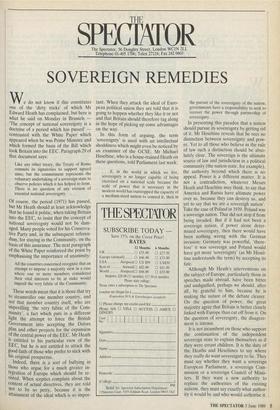SPECTAT TRE OR
The Spectator, 56 Doughty Street, London WC1N 2LL Telephone 01-405 1706; Telex 27124; Fax 242 0603
SOVEREIGN REMEDIES
We do not know if this constitutes one of the 'dirty tricks' of which Mr Edward Heath has complained, but here is what he said on Monday in Brussels 'The concept of national sovereignty is a doctrine of a period which has passed' — contrasted with. the White Paper which appeared when he was Prime Minister and which formed the basis of the Bill which took Britain into the EEC. Paragraph 29 of that document says: Like any other treaty, the Treaty of Rome commits its signatories to support agreed aims; but the commitment represents the voluntary undertaking of a sovereign state to observe policies which it has helped to form. There is no question of any erosion of essential national sovereignty. . . .
Of course, the period (1971) has passed, but Mr Heath should at least acknowledge that he found it politic, when taking Britain into the EEC, to insist that the concept of national sovereignty would not be dam- aged. Many people voted for his Conserva- tive. Party and, in the subsequent referen- dum, for staying in the Community, on the basis of this assurance. The next paragraph of the White Paper reinforced the point by emphasising the importance of unanimity: All the countries concerned recognise that an attempt to impose a majority view in a case where one or more members considered their vital interests to be at stake would imperil the very fabric of the Community.
These words mean that it is those that try to steamroller one member country, and not that member country itself, who are imperilling 'the very fabric of the Com- munity', a fact which puts in a different light the attempt to force the British Government into accepting the Delors plan and other projects for the expansion of the central power of the EEC. Mr Heath is entitled to his particular view of the EEC, but he is not entitled to attack the good faith of those who prefer to stick with his original prospectus. Indeed, there is a sort of bullying in those who argue for a much greater in- tegration of Europe which should be re- sisted. When sceptics complain about the content of actual directives, they are told not to be so petty, because it is the attainment of the ideal which is so impor- tant. When they attack the ideal of Euro- pean political union they are told that it is going to happen whether they like it or not and that Britain should therefore tag along in the hope of picking up some advantages on the way.
In this form of arguing, the term 'sovereignty' is used with an intellectual shoddiness which might even be noticed by an examiner of the GCSE. Mr Michael Heseltine, who is a house-trained Heath on these questions, told Parliament last week: . . . if, in the world in which we live, sovereignty is no longer capable of being exercised on a national scale because the scale of power that is necessary in the modern world has outstripped the capacity of a medium-sized nation to control it, then in
the pursuit of the sovereignty of the nation, governments have a responsibility to seek to recover the power through partnership of sovereignty.. .
In presenting this paradox that a nation should pursue its sovereignty by getting rid of it, Mr Heseltine reveals that he sees no distinction between sovereignty and pow- er. Yet to all those who believe in the rule of law such a distinction should be abso- lutely clear. The sovereign is the ultimate source of law and jurisdiction in a political community (the nation state, for example), the authority beyond which there is no appeal. Power is a different matter. It is not a contradiction, whatever Messrs Heath and Heseltine may think, to say that America and Russia have ultimate power over us, because they can destroy us, and yet to say that we are a sovereigh nation'. Take the case of Poland in 1939. Poland was a sovereign nation. That did not stop if from being invaded. But if it had not been a sovereign nation, if power alone deter- mined sovereignty, then there would have been nothing wrong with the German invasion: Germany was powerful, 'there- fore' it was sovereign and Poland would have got more 'sovereignty' (as Mr Hesel- tine understands the term) by accepting its fate.
Although Mr Heath's interventions on the subject of Europe, particularly those in speeches made abroad, have been bitter and undignified, perhaps we should, after all,, be grateful to him, because he is making the nature of the debate clearer. On the question of power, the great majority agree that Britain is better closely linked with Europe than cut off from it. On the question of sovereignty, the disagree- ment is intense.
It is not incumbent on those who support the continuation of the independent sovereign state to explain themselves as if they were errant children. It is the duty of the Heaths and Heseltines to say where they really do want sovereignty to lie. They must say whether they want a sovereign European Parliament, a sovereign Com- mission or a sovereign Council of Minis- ters. If they want a new authority to replace the authorities of the existing nations, they must say exactly what author- ity it would be and who would authorise it.


















































 Previous page
Previous page